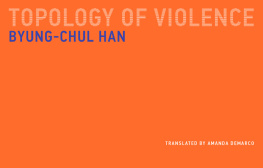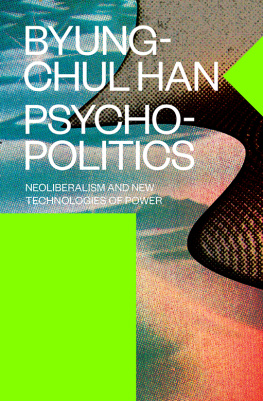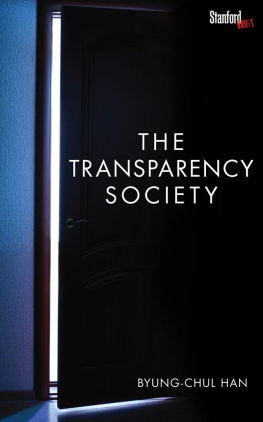Byung-Chul Han - Hyperculture
Here you can read online Byung-Chul Han - Hyperculture full text of the book (entire story) in english for free. Download pdf and epub, get meaning, cover and reviews about this ebook. year: 2022, publisher: Wiley, genre: Religion. Description of the work, (preface) as well as reviews are available. Best literature library LitArk.com created for fans of good reading and offers a wide selection of genres:
Romance novel
Science fiction
Adventure
Detective
Science
History
Home and family
Prose
Art
Politics
Computer
Non-fiction
Religion
Business
Children
Humor
Choose a favorite category and find really read worthwhile books. Enjoy immersion in the world of imagination, feel the emotions of the characters or learn something new for yourself, make an fascinating discovery.
- Book:Hyperculture
- Author:
- Publisher:Wiley
- Genre:
- Year:2022
- Rating:5 / 5
- Favourites:Add to favourites
- Your mark:
- 100
- 1
- 2
- 3
- 4
- 5
Hyperculture: summary, description and annotation
We offer to read an annotation, description, summary or preface (depends on what the author of the book "Hyperculture" wrote himself). If you haven't found the necessary information about the book — write in the comments, we will try to find it.
Hyperculture — read online for free the complete book (whole text) full work
Below is the text of the book, divided by pages. System saving the place of the last page read, allows you to conveniently read the book "Hyperculture" online for free, without having to search again every time where you left off. Put a bookmark, and you can go to the page where you finished reading at any time.
Font size:
Interval:
Bookmark:
Byung-Chul Han
Translated by Daniel Steuer
polity
Originally published in German as Hyperkulturalitt: Kultur und Globalisierung
Merve Verlag, 2005
This English edition Polity Press, 2022
Excerpt from: Peter Handke, Am Felsfenster morgens (und andere Ortszeiten 19821987)
Suhrkamp Verlag, Berlin, 2019
Excerpt from: Peter Handke, Phantasien der Wiederholung Suhrkamp Verlag, Frankfurt am Main, 1983. All rights reserved by and controlled through Suhrkamp Verlag.
Polity Press
65 Bridge Street
Cambridge CB2 1UR, UK
Polity Press
101 Station Landing
Suite 300
Medford, MA 02155, USA
All rights reserved. Except for the quotation of short passages for the purpose of criticism and review, no part of this publication may be reproduced, stored in a retrieval system or transmitted, in any form or by any means, electronic, mechanical, photocopying, recording or otherwise, without the prior permission of the publisher.
ISBN-13: 978-1-5095-4618-3
A catalogue record for this book is available from the British Library.
Library of Congress Control Number: 2021942107
Excerpt from: Peter Handke, Phantasien der Wiederholung. Suhrkamp Verlag Frankfurt am Main
1983. Alle Rechte bei und vorbehalten durch Suhrkamp Verlag Berlin.
Excerpt from: Peter Handke, Am Felsfenster morgens (und andere Ortszeiten 19821987).
Suhrkamp Verlag Berlin 2019.
The publisher has used its best endeavours to ensure that the URLs for external websites referred to in this book are correct and active at the time of going to press. However, the publisher has no responsibility for the websites and can make no guarantee that a site will remain live or that the content is or will remain appropriate.
Every effort has been made to trace all copyright holders, but if any have been overlooked the publisher will be pleased to include any necessary credits in any subsequent reprint or edition.
For further information on Polity, visit our website:
politybooks.com
But the fear of the new is often as strong as the fear of the void, even when the new is the overcoming of the void. That explains why the many only see absurd chaos where a new meaning seeks to introduce its order. Indeed, the old nomos is fading away, dragging the whole system of redundant standards, norms, and traditions with it in its fall. But what is coming is not therefore devoid of standards, is not a pure nothingness, inimical to any nomos. Even in the fiercest struggle between old and new forces just standards emerge and meaningful proportions form.
Here, too, are gods that rule.
Ample are their bounds.
Carl Schmitt
- Carl Schmitt, Land and Sea, trans. Simona Draghici, Washington, DC: Plutarch Press, 1997, p. 59 (transl. amended).
Where do you want to go today?
Microsoft
The British ethnologist Nigel Barley once expressed the suspicion that the true key to the future was that fundamental concepts such as culture will cease to exist. We are all, Barley said, more or less tourists in Hawaiian shirts. After the end of culture, should the new human being simply be called tourist? Or are we at long last living in a culture that affords us the freedom to spread into the wide open world? If we are, how might we describe this new culture?
- See Der Spiegel, 44/2000.
In his Lectures on the Philosophy of History, Hegel offers the following remark on the genesis of Greek culture: We have just spoken of heterogeneity [Fremdartigkeit] as an element of the Greek Spirit, and it is well known that the rudiments of Greek civilization are connected with the advent of foreigners. It was thus the advent of foreigners that constituted Greek culture. With grateful recollection, he says, the Greeks preserved the arrival of the foreigners in their mythology. The original meaning of colluvies is mud, filth, hotchpotch, confusion, or muddle.
According to Hegel, it is a superficial and absurd idea that such a beautiful and truly free life can be produced by a process so incomplex as the development of a race keeping within the limits of blood-relationship and friendship. Rather, the inherent heterogeneity [Fremdartigkeit in sich selbst] of spirit is that through which alone it acquires the power of realizing itself as Spirit. From this perspective, the presence of the foreign is necessary for the formation of ones own.
In his description of the historical development of the Greek world, Hegel obviously tries to do justice to the fact that the foreign, heterogeneity itself, has a constitutive effect. With regard to the identity of European culture, however, he adopts an altogether different tone. Here, he emphatically invokes the idea of Europe as home. The Europeans might have taken their religion from the East, but all that satisfies their spiritual life [geistiges Leben] they received from Greece: The name of Greece evokes feelings of home in the educated men in Europe, especially in us Germans.Happiness is conceived as a phenomenon associated with the family, the homeland and household. It originates from a not outside, not beyond, from the site. In this sense, site is a synonym for spirit [Geist].
Given his genealogical-historical realization that the formation of Greek culture was owed to the arrival of foreigners, or to heterogeneity in itself, Hegels emphasis on the native home is disconcerting. It seems as though history does not coincide with that historical moment which produces ones own: the site in the proper sense. There is no longer any mention of the fact that blood-relationship or friendship leads to an impoverishment of spirit. Rather, Hegel evokes images of home, family and fatherland. What matters is being homely and contented in oneself. As far as European culture is concerned, Hegels spirit has apparently rid itself of that heterogeneity in itself which once provided it with the power of realizing itself as Spirit. There is no longer any foreign culture, no arrival of foreigners that would pull the Europeans out of their happy not outside, not beyond. Thus, European culture becomes self-contented. It is satisfied with itself. There is no heterogeneity in itself to irritate it. According to Hegels own theory, however, this would lead to a spiritual rigor mortis.
In his Outlines of a Philosophy of the History of Man, Herder remarks that all the cultivation of the east, west, and north of Europe, is a plant sprung from roman, greek, and arabic feed.
Are we today approaching a culture that is no longer characterized by the deafness and blindness on which happiness depends, a culture that, expressed in acoustic terms, has become a boundless, even site-less, hypercultural acoustic space in which the most diverse sounds are jammed together side by side? The hypercultural condition of the side by side, of simultaneity and of the as well as, would change the topology of happiness.
National happiness, the song of the soul that creates happiness, is probably unknown to the tourists in Hawaiian shirts. Their happiness is of an altogether different kind; it is a happiness that emerges from an abolition of facticity, a removal of the attachment to the here, the site. In their case, the foreign is not sickness. It is something new to be appropriated. The tourists in Hawaiian shirts inhabit a world that unbounds itself, a hypermarket of culture, a hyperspace of possibilities. Are they less happy than the souls that make up a nation or populate a homeland? Is their form of life less desirable than that of the others? Does the abolition of facticity not lead to an increased freedom? Is the tourist in the Hawaiian shirt not the embodiment of the future happiness of
Font size:
Interval:
Bookmark:
Similar books «Hyperculture»
Look at similar books to Hyperculture. We have selected literature similar in name and meaning in the hope of providing readers with more options to find new, interesting, not yet read works.
Discussion, reviews of the book Hyperculture and just readers' own opinions. Leave your comments, write what you think about the work, its meaning or the main characters. Specify what exactly you liked and what you didn't like, and why you think so.












